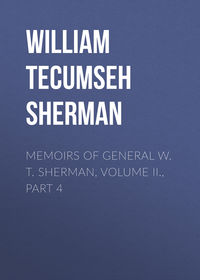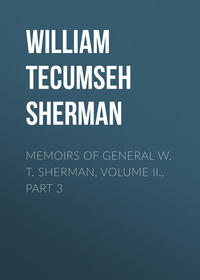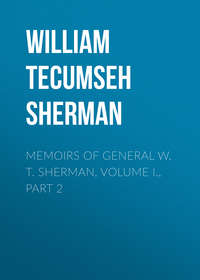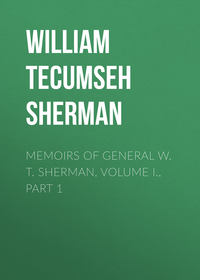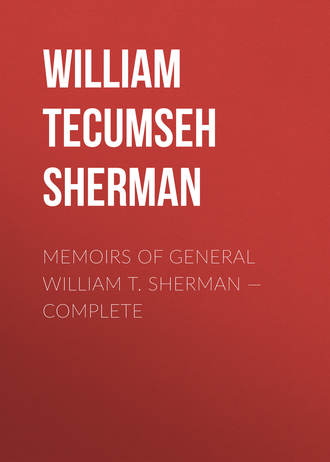 полная версия
полная версияMemoirs of General William T. Sherman — Complete
The law is one thing, the execution of the law another. God himself has commanded: "Thou shalt not kill," "thou shalt not steal," "thou shalt not covet thy neighbor's goods," etc. Will any one say these things are not done now as well as before these laws were announced at Sinai. I admit the law to be that "no officer or soldier of the United States shall commit waste or destruction of cornfields, orchards, potato-patches, or any kind of pillage on the property of friend or foe near Memphis," and that I stand prepared to execute the law as far as possible.
No officer or soldier should enter the house or premises of any peaceable citizen, no matter what his politics, unless on business; and no such officer or soldier can force an entrance unless he have a written order from a commanding officer or provost-marshal, which written authority must be exhibited if demanded. When property such as forage, building or other materials are needed by the United States, a receipt will be given by the officer taking them, which receipt should be presented to the quartermaster, who will substitute therefor a regular voucher, to be paid-according to the circumstances of the case. If the officer refuse to give such receipt, the citizen may fairly infer that the property is wrongfully taken, and he should, for his own protection, ascertain the name, rank, and regiment of the officer, and report him in writing. If any soldier commits waste or destruction, the person whose property is thus wasted must find out the name, company, and regiment of the actual transgressor. In order to punish there must be a trial, and there must be testimony. It is not sufficient that a general accusation be made, that soldiers are doing this or that. I cannot punish my whole command, or a whole battalion, because one or two bad soldiers do wrong. The punishment must reach the perpetrators, and no one can identify them as well as the party who is interested. The State of Tennessee does not hold itself responsible for acts of larceny committed by her citizens, nor does the United Staten or any other nation. These are individual acts of wrong, and punishment can only be inflicted on the wrong-doer. I know the difficulty of identifying particular soldiers, but difficulties do not alter the importance of principles of justice. They should stimulate the parties to increase their efforts to find out the actual perpetrators of the crime.
Colonels of regiments and commanders of corps are liable to severe punishment for permitting their men to leave their camps to commit waste or destruction; but I know full well that many of the acts attributed to soldiers are committed by citizens and negroes, and are charged to soldiers because of a desire to find fault with them; but this only reacts upon the community and increases the mischief. While every officer would willingly follow up an accusation against any one or more of his men whose names or description were given immediately after the discovery of the act, he would naturally resent any general charge against his good men, for the criminal conduct of a few bad ones.
I have examined into many of the cases of complaint made in this general way, and have felt mortified that our soldiers should do acts which are nothing more or less than stealing, but I was powerless without some clew whereby to reach the rightful party. I know that the great mass of our soldiers would scorn to steal or commit crime, and I will not therefore entertain vague and general complaints, but stand, prepared always to follow up any reasonable complaint when the charge is definite and the names of witnesses furnished.
I know, moreover, in some instances when our soldiers are complained of, that they have been insulted by sneering remarks about "Yankees," "Northern barbarians," "Lincoln's hirelings," etc. People who use such language must seek redress through some one else, for I will not tolerate insults to our country or cause. When people forget their obligations to a Government that made them respected among the nations of the earth, and speak contemptuously of the flag which is the silent emblem of that country, I will not go out of my way to protect them or their property. I will punish the soldiers for trespass or waste if adjudged by a court-martial, because they disobey orders; but soldiers are men and citizens as well as soldiers, and should promptly resent any insult to their country, come from what quarter it may. I mention this phase because it is too common. Insult to a soldier does not justify pillage, but it takes from the officer the disposition he would otherwise feel to follow up the inquiry and punish the wrong-doers.
Again, armies in motion or stationary must commit some waste. Flankers must let down fences and cross fields; and, when an attack is contemplated or apprehended, a command will naturally clear the ground of houses, fences, and trees. This is waste, but is the natural consequence of war, chargeable on those who caused the war. So in fortifying a place, dwelling-houses must be taken, materials used, even wasted, and great damage done, which in the end may prove useless. This, too, is an expense not chargeable to us, but to those who made the war; and generally war is destruction and nothing else.
We must bear this in mind, that however peaceful things look, we are really at war; and much that looks like waste or destruction is only the removal of objects that obstruct our fire, or would afford cover to an enemy.
This class of waste must be distinguished from the wanton waste committed by army-stragglers, which is wrong, and can be punished by the death-penalty if proper testimony can be produced.
Yours, etc.,
W. T. SHERMAN, Major-General commanding.Satisfied that, in the progress of the war, Memphis would become an important depot, I pushed forward the construction of Fort Pickering, kept most of the troops in camps back of the city, and my own headquarters remained in tents on the edge of the city, near Mr. Moon's house, until, on the approach of winter, Mrs. Sherman came down with the children to visit me, when I took a house nearer the fort.
All this time battalion and brigade drills were enforced, so that, when the season approached for active operations farther south, I had my division in the best possible order, and about the 1st of November it was composed as follows:
First Brigade, Brigadier-General M. L. SMITH—Eighth Missouri, Colonel G. A. Smith; Sixth Missouri, Colonel Peter E. Bland; One Hundred and Thirteenth Illinois, Colonel George B. Hoge; Fifty-fourth Ohio, Colonel T. Kilby Smith; One Hundred and Twentieth Illinois, Colonel G. W. McKeaig.
Second Brigade, Colonel JOHN ADAIR McDOWELL.—Sixth Iowa, Lieutenant-Colonel John M. Corse; Fortieth Illinois, Colonel J. W. Booth; Forty-sixth Ohio, Colonel O. C. Walcutt; Thirteenth United States Infantry, First Battalion, Major D. Chase.
Third Brigade, Brigadier-General J. W. DENVER.—Forty-eighth Ohio, Colonel P. J. Sullivan; Fifty-third Ohio, Colonel W. S. Jones; Seventieth Ohio, Colonel J. R. Cockerill.
Fourth Brigade, Colonel DAVID STUART.—Fifty-fifth Illinois, Colonel O. Malmburg; Fifty-seventh Ohio, Colonel W. Mungen; Eighty-third Indiana, Colonel B. Spooner; One Hundred and Sixteenth Illinois, Colonel Tupper; One Hundred and Twenty-seventh Illinois, Lieutenant-Colonel Eldridge.
Fifth Brigade, Colonel R. P. BUCKLAND.—Seventy-second Ohio, Lieutenant-Colonel D. W. C. Loudon; Thirty-second Wisconsin, Colonel J. W. Howe; Ninety-third Indiana, Colonel Thomas; Ninety-third Illinois, Major J. M. Fisher.
Subsequently, Brigadier-General J. G. Lauman arrived at Memphis, and I made up a sixth brigade, and organized these six brigades into three divisions, under Brigadier-Generals M. L. Smith, J. W. Denver, and J. G. Lauman.
About the 17th of November I received an order from General Grant, dated:
LAGRANGE, November 16, 1862.
Meet me at Columbus, Kentucky, on Thursday next. If you have a good map of the country south of you, take it up with you.
U. S. GRANT, Major-General.
I started forthwith by boat, and met General Grant, who had reached Columbus by the railroad from Jackson, Tennessee. He explained to me that he proposed to move against Pemberton, then intrenched on a line behind the Tallahatchie River below Holly Springs; that he would move on Holly Springs and Abberville, from Grand Junction; that McPherson, with the troops at Corinth, would aim to make junction with him at Holly Springs; and that he wanted me to leave in Memphis a proper garrison, and to aim for the Tallahatchie, so as to come up on his right by a certain date. He further said that his ultimate object was to capture Vicksburg, to open the navigation of the Mississippi River, and that General Halleck had authorized him to call on the troops in the Department of Arkansas, then commanded by General S. R. Curtis, for cooperation. I suggested to him that if he would request General Curtis to send an expedition from some point on the Mississippi, near Helena, then held in force, toward Grenada, to the rear of Pemberton, it would alarm him for the safety of his communications, and would assist us materially in the proposed attack on his front. He authorized me to send to the commanding officer at Helena a request to that effect, and, as soon as I reached Memphis, I dispatched my aide, Major McCoy, to Helena, who returned, bringing me a letter from General Frederick Steele, who had just reached Helena with Osterhaus's division, and who was temporarily in command, General Curtis having gone to St. Louis. This letter contained the assurance that he "would send from Friar's Point a large force under Brigadier-General A. P. Hovey in the direction of Grenada, aiming to reach the Tallahatchie at Charleston, on the next Monday, Tuesday, or Wednesday (December 1st) at furthest." My command was appointed to start on Wednesday, November 24th, and meantime Major-General S. A. Hurlbut, having reported for duty, was assigned to the command of Memphis, with four regiments of infantry one battery of artillery, two companies of Thielman's cavalry and the certain prospect of soon receiving a number of new regiments, known to be en route.
I marched out of Memphis punctually with three small divisions, taking different roads till we approached the Tallahatchie, when we converged on Wyatt to cross the river, there a bold, deep stream, with a newly-constructed fort behind. I had Grierson's Sixth Illinois Cavalry with me, and with it opened communication with General Grant when we were abreast of Holly Springs. We reached Wyatt on the 2d day of December without the least opposition, and there learned that Pemberton's whole army had fallen back to the Yalabusha near Grenada, in a great measure by reason of the exaggerated reports concerning the Helena force, which had reached Charleston; and some of General Hovey's cavalry, under General Washburn, having struck the railroad in the neighborhood of Coffeeville, naturally alarmed General Pemberton for the safety of his communications, and made him let go his Tallahatchie line with all the forts which he had built at great cost in labor. We had to build a bridge at Wyatt, which consumed a couple of days, and on the 5th of December my whole command was at College Hill, ten miles from Oxford, whence I reported to General Grant in Oxford.
On the 8th I received the following letter:
OXFORD MISSISSIPPI, December 8, 1862—Morning
General SHERMAN, College Hill.
DEAR GENERAL: The following is a copy of dispatch just received from Washington:
WASHINGTON, December 7, 1862—12M
General GRANT:
The capture of Grenada may change our plans in regard to Vicksburg. You will move your troops as you may deem best to accomplish the great object in view. You will retain, till further orders, all troops of General Curtis now in your department. Telegraph to General Allen in St. Louis for all steamboats you may require. Ask Porter to cooperate. Telegraph what are your present plans.
H. W. HALLECK, General-in.-Chief.
I wish you would come over this evening and stay to-night, or come in the morning. I would like to talk with you about this matter. My notion is to send two divisions back to Memphis, and fix upon a day when they should effect a landing, and press from here with this command at the proper time to cooperate. If I do not do this I will move our present force to Grenada, including Steele's, repairing road as we proceed, and establish a depot of provisions there. When a good ready is had, to move immediately on Jackson, Mississippi, cutting loose from the road. Of the two plans I look most favorably on the former.
Come over and we will talk this matter over. Yours truly,
U. S. GRANT, Major-General.
I repaired at once to Oxford, and found General Grant in a large house with all his staff, and we discussed every possible chance. He explained to me that large reenforcements had been promised, which would reach Memphis very soon, if not already there; that the entire gunboat fleet, then under the command of Admiral D. D. Porter, would cooperate; that we could count on a full division from the troops at Helena; and he believed that, by a prompt movement, I could make a lodgment up the Yazoo and capture Vicksburg from the rear; that its garrison was small, and he, at Oxford, would so handle his troops as to hold Pemberton away from Vicksburg. I also understood that, if Pemberton should retreat south, he would follow him up, and would expect to find me at the Yazoo River, if not inside of Vicksburg. I confess, at that moment I did not dream that General McClernand, or anybody else, was scheming for the mere honor of capturing Vicksburg. We knew at the time that General Butler had been reenforced by General Banks at New Orleans, and the latter was supposed to be working his way up-stream from New Orleans, while we were working down. That day General Grant dispatched to General Halleck, in Washington, as follows:
OXFORD, December 8, 1862.
Major-General H. W. HALLECK, Washington, D. C.:
General Sherman will command the expedition down the Mississippi. He will have a force of about forty thousand men; will land above Vicksburg (up the Yazoo, if practicable), and out the Mississippi Central road and the road running east from Vicksburg, where they cross Black River. I will cooperate from here, my movements depending on those of the enemy. With the large cavalry force now at my command, I will be able to have them show themselves at different points on the Tallahatchie and Yalabusha; and, when an opportunity occurs, make a real attack. After cutting the two roads, General Sherman's movements to secure the end desired will necessarily be left to his judgment.
I will occupy this road to Coffeeville.
U. S. GRANT, Major-General.I was shown this dispatch before it was sent, and afterward the general drew up for me the following letter of instructions in his own handwriting, which I now possess:
HEADQUARTERS THIRTEENTH ARMY CORPS DEPARTMENT OF THE TENNESSEE, OXFORD, Mississippi, December 8, 1862.
Major-General W. T. SHERMAN, commanding Right Wing Army In the Field, present.
GENERAL: You will proceed with as little delay as practicable to Memphis, Tennessee, taking with you one division of your present command. On your arrival at Memphis you will assume command of all the troops there, and that portion of General Curtis's forces at present east of the Mississippi River, and organize them into brigades and divisions in your own way.
As soon as possible move with them down the river to the vicinity of Vicksburg, and, with the cooperation of the gunboat fleet under command of Flag-Officer Porter, proceed to the reduction of that place in such manner as circumstances and your own judgment may dictate.
The amount of rations, forage, land transportation, etc., necessary to take, will be left entirely to yourself.
The quartermaster in St. Louis will be instructed to send you transportation for thirty thousand men. Should you still find yourself deficient, your quartermaster will be authorized to make up the deficiency from such transports as may come into the port of Memphis.
On arriving in Memphis put yourself in communication with Admiral Porter, and arrange with him for his cooperation.
Inform me at the earliest practicable day of the time when you will embark, and such plans as may then be matured. I will hold the forces here in readiness to cooperate with you in such manner as the movements of the enemy may make necessary.
Leave the District of Memphis in the command of an efficient officer and with a garrison of four regiments of infantry, the siege-guns, and what ever cavalry force may be there.
One regiment of infantry and at least a section of artillery will also be left at Friar's Point or Delta, to protect the stores of the cavalry post that will be left there. Yours truly,
U. S. GRANT, Major-General.I also insert here another letter, dated the 14th instant, sent afterward to me at Memphis, which completes all instructions received by me governing the first movement against Vicksburg:
HEADQUARTERS DEPARTMENT OF THE TENNESSEE
OXFORD, MISSISSIPPI, December 14, 1862
Major-General SHERMAN, commanding, etc.,
Memphis, Tennessee.
I have not had one word from Grierson since he left, and am getting uneasy about him. I hope General Gorman will give you no difficulty about retaining the troops on this side the river, and Steele to command them. The twenty-one thousand men you have, with the twelve thousand from Helena, will make a good force. The enemy are as yet on the Yalabusha. I am pushing down on them slowly, but so as to keep up the impression of a continuous move. I feel particularly anxious to have the Helena cavalry on this side of the river; if not now, at least after you start. If Gorman will send them, instruct them where to go and how to communicate with me. My headquarters will probably be in Coffeeville one week hence.... In the mean time I will order transportation, etc.... It would be well if you could have two or three small boats suitable for navigating the Yazoo. It may become necessary for me to look to that base for supplies before we get through....
U. S. GRANT, Major-General.When we rode to Oxford from College Hill, there happened a little circumstance which seems worthy of record. While General Van Dorn had his headquarters in Holly Springs, viz., in October, 1862, he was very short of the comforts and luxuries of life, and resorted to every possible device to draw from the abundant supplies in Memphis. He had no difficulty whatever in getting spies into the town for information, but he had trouble in getting bulky supplies out through our guards, though sometimes I connived at his supplies of cigars, liquors, boots, gloves, etc., for his individual use; but medicines and large supplies of all kinds were confiscated, if attempted to be passed out. As we rode that morning toward Oxford, I observed in a farmer's barn-yard a wagon that looked like a city furniture-wagon with springs. We were always short of wagons, so I called the attention of the quartermaster, Colonel J. Condit Smith, saying, "There is a good wagon; go for it." He dropped out of the retinue with an orderly, and after we had ridden a mile or so he overtook us, and I asked him, "What luck?" He answered, "All right; I have secured that wagon, and I also got another," and explained that he had gone to the farmer's house to inquire about the furniture-wagon, when the farmer said it did not belong to him, but to some party in Memphis, adding that in his barn was another belonging to the same party. They went to the barn, and there found a handsome city hearse, with pall and plumes. The farmer said they had had a big funeral out of Memphis, but when it reached his house, the coffin was found to contain a fine assortment of medicines for the use of Van Dorn's army. Thus under the pretense of a first-class funeral, they had carried through our guards the very things we had tried to prevent. It was a good trick, but diminished our respect for such pageants afterward.
As soon as I was in possession of General Grant's instructions of December 8th, with a further request that I should dispatch Colonel Grierson, with his cavalry, across by land to Helena, to notify General Steele of the general plan, I returned to College Hill, selected the division of Brigadier-General Morgan L. Smith to return with me to Memphis; started Grierson on his errand to Helena, and ordered Generals Denver and Lauman to report to General Grant for further orders. We started back by the most direct route, reached Memphis by noon of December 12th, and began immediately the preparations for the Vicksburg movement. There I found two irregular divisions which had arrived at Memphis in my absence, commanded respectively by Brigadier-General A. J. Smith and Brigadier-General George W. Morgan. These were designated the First and Third Divisions, leaving the Second Division of Morgan Z. Smith to retain its original name and number.
I also sent orders, in the name of General Grant, to General Gorman, who meantime had replaced General Steele in command of Helena, in lieu of the troops which had been east of the Mississippi and had returned, to make up a strong division to report to me on my way down. This division was accordingly organized, and was commanded by Brigadier-General Frederick Steele, constituting my Fourth Division.
Meantime a large fleet of steamboats was assembling from St. Louis and Cairo, and Admiral Porter dropped down to Memphis with his whole gunboat fleet, ready to cooperate in the movement. The preparations were necessarily hasty in the extreme, but this was the essence of the whole plan, viz., to reach Vicksburg as it were by surprise, while General Grant held in check Pemberton's army about Grenada, leaving me to contend only with the smaller garrison of Vicksburg and its well-known strong batteries and defenses. On the 19th the Memphis troops were embarked, and steamed down to Helena, where on the 21st General Steele's division was also embarked; and on the 22d we were all rendezvoused at Friar's Point, in the following order, viz.:
Steamer Forest Queen, general headquarters, and battalion Thirteenth United States Infantry.
First Division, Brigadier-General A. J. SMITH.—Steamers Des Arc, division headquarters and escort; Metropolitan, Sixth Indiana; J. H. Dickey, Twenty-third Wisconsin; J. C. Snow, Sixteenth Indiana; Hiawatha, Ninety-sixth Ohio; J. S. Pringle, Sixty-seventh Indiana; J. W. Cheeseman, Ninth Kentucky; R. Campbell, Ninety-seventh Indiana; Duke of Argyle, Seventy-seventh Illinois; City of Alton, One Hundred and Eighth and Forty-eighth Ohio; City of Louisiana, Mercantile Battery; Ohio Belle, Seventeenth Ohio Battery; Citizen, Eighty-third Ohio; Champion, commissary-boat; General Anderson, Ordnance.
Second Division,, Brigadier-General M. L. SMITH.—Steamers Chancellor, headquarters, and Thielman's cavalry; Planet, One Hundred and Sixteenth Illinois; City of Memphis, Batteries A and B (Missouri Artillery), Eighth Missouri, and section of Parrott guns; Omaha, Fifty-seventh Ohio; Sioux City, Eighty-third Indiana; Spread Eagle, One Hundred and Twenty-seventh Illinois; Ed. Walsh, One Hundred and Thirteenth Illinois; Westmoreland, Fifty-fifth Illinois, headquarters Fourth Brigade; Sunny South, Fifty-fourth Ohio; Universe, Sixth Missouri; Robert Allen, commissary-boat.
Third Division, Brigadier-General G. W. MORGAN.—Steamers Empress, division headquarters; Key West, One Hundred and Eighteenth Illinois; Sam Gaty, Sixty-ninth Indiana; Northerner, One Hundred and Twentieth Ohio; Belle Peoria, headquarters Second Brigade, two companies Forty-ninth Ohio, and pontoons; Die Vernon, Third Kentucky; War Eagle, Forty-ninth Indiana (eight companies), and Foster's battery; Henry von Phul, headquarters Third Brigade, and eight companies Sixteenth Ohio; Fanny Bullitt, One Hundred and Fourteenth Ohio, and Lamphere's battery; Crescent City, Twenty-second Kentucky and Fifty-fourth Indiana; Des Moines, Forty-second Ohio; Pembina, Lamphere's and Stone's batteries; Lady Jackson, commissary-boat.


